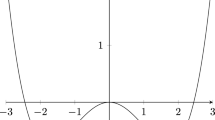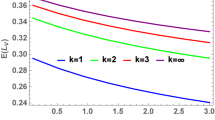Abstract
In this paper we perform Infinitesimal Perturbation Analysis (IPA) for a single-stage stochastic fluid queue that is shared between two competing sources, one that employs additive loss-feedback congestion control and the other that employs no congestion-control (i.e., it is unresponsive). This scenario is applicable within the realm of computer communication networks particularly at bottleneck router queues where multiple and diverse flows compete for bandwidth. We optimize the tradeoff between total loss volume and queue workload (a measure for queueing delay). Although a sound knowledge of the system’s dynamics is required to derive the IPA gradient estimators, no knowledge of the underlying probability distributions governing the system is required. What results are fairly simple counting processes, whose values can be computed directly from an ongoing live stream of traffic.











Similar content being viewed by others
Notes
This applies also to the queue-workload derivative
References
Cassandras C, Sun G, Panayiotou C (2001) Stochastic fluid models for control and optimization of systems with quality of service requirements. In: Proceedings of the 40th IEEE Conference on Decision and Control, 2001, vol 2, pp 1917–22
Cassandras C, Sun G, Panayiotou C, Wardi Y (2003) Perturbation analysis and control of two-class stochastic fluid models for communication networks. IEEE Trans Autom Control 48(5):770–82
Cassandras CG, Wardi Y, Panayiotou CG, Yao C (2010) Perturbation analysis and optimization of stochastic hybrid systems. Eur J Control 6(6):642–661
Nosrati S, Nikravesh S (2004) Perturbation analysis for loss volume and buffer workload in tandem two-class stochastic fluid models for communication networks. In: Proceedings of the 5th Asian Control Conference, 2004, pp 701–7
Panayiotou C (2004) On-line resource sharing in communication networks using infinitesimal perturbation analysis of stochastic fluid models. In: Proceedings of the 43rd IEEE Conference on Decision and Control (CDC), 2004, vol 1. Nassau, Bahamas, pp 563–8
Sun G, Cassandras C, Wardi Y, Panayiotou C (2003) Perturbation analysis of stochastic flow networks. In: Proceedings of the 42nd IEEE International Conference on Decision and Control, 2004, pp 4831–6
Sun G, Cassandras C, Wardi Y, Panayiotou C, Riley G (2004) Perturbation analysis and optimization of stochastic flow networks. IEEE Trans Autom Control 49(12):2143–59
Sun G, Cassandras CG, Panayiotou CG (2004) Perturbation analysis of multiclass stochastic fluid models. Discret Event Dyn Syst 14(3):267–307
Wardi Y, Adams R, Melamed B (2010) A unified approach to infinitesimal perturbation analysis in stochastic flow models: The single-stage case. IEEE Trans Autom Control 55(1):89–103
Wardi Y, Melamed B (2001) Estimating nonparametric IPA derivatives of loss functions in tandem fluid models. In: Proceedings of the 40th IEEE Conference on Decision and Control, 2001, pp 4517–22
Wardi Y, Melamed B, Cassandras C, Panaytou C (2002) Online IPA gradient estimators in stochastic continuous fluid models. J Optim Theory Appl 115(2):369–405
Wardi Y, Riley G (2002) IPA for loss volume and buffer workload in tandem SFM networks. In: Proceedings of the Sixth International Workshop on Discrete Event Systems, 2002, pp 393–8
Wardi Y, Riley G (2004) IPA for spillover volume in a fluid queue with retransmissions. In: Proceedings of the 43rd IEEE Conference on Decision and Control (CDC), 2004, pp 3756–61
Wardi Y, Riley GF (2010) Infinitesimal perturbation analysis in networks of stochastic flow models: General framework and case study of tandem networks with flow control. Discret Event Dyn Syst: Theory Appl 20(2):275–305
Yao C, Cassandras C (2009) Perturbation analysis and optimization of multiclass multiobjective stochastic flow models. In: Proceedings of the 48th IEEE Conference on Decision and Control, 2009, pp 914–919
Yao C, Cassandras C (2011) Perturbation analysis of stochastic hybrid systems and applications to resource contention games. Front Electr Electron Eng China 6(3):453–467
Yu H, Cassandras C (2003) Perturbation analysis of feedback-controlled stochastic flow systems. In: Proceedings of the 42nd IEEE International Conference on Decision and Control, 2003, pp 6277–82
Yu H, Cassandras C (2004) Multiplicative feedback control in communication networks using stochastic flow models. In: Proceedings of the 43rd IEEE Conference on Decision and Control (CDC), 2004, pp 557–62
Yu H, Cassandras C (2004) Perturbation analysis of feedback-controlled stochastic flow systems. IEEE Trans Autom Control 49(8):1317–32
Yu H, Cassandras C (2004) Perturbation analysis of stochastic flow systems with multiplicative feedback. In: Proceedings of the 2004 American Control Conference, 2004, pp 5734–9
Author information
Authors and Affiliations
Corresponding author
Appendix: Derivation of α 1
Appendix: Derivation of α 1
During a full-period:
Now, for all σ 1(t),σ 2(t),β(t) and c:
so that
Therefore
Denote
Rights and permissions
About this article
Cite this article
Adams, R.V. Infinitesimal perturbation analysis of a single-stage fluid queue with loss feedback and non-responsive competing traffic. Discrete Event Dyn Syst 26, 367–382 (2016). https://doi.org/10.1007/s10626-014-0203-9
Received:
Accepted:
Published:
Issue Date:
DOI: https://doi.org/10.1007/s10626-014-0203-9




